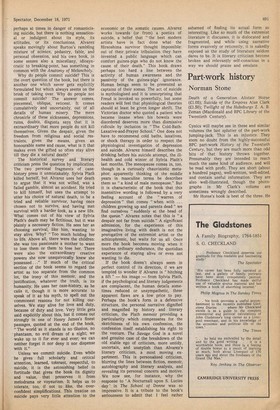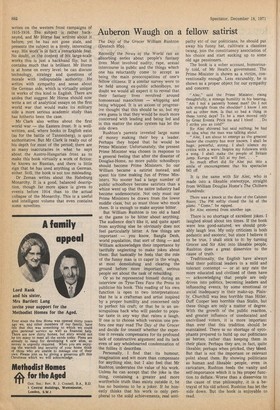Part-work history
Norman Stone
Death of a Generation Alistair Horne (£1.05); Suicide of the Empires Alan Clark (£1.50); Twilight of the Habsburgs Z. A. B. Zeman (Macdonald and BPC Library of the Twentieth Century).
Cynics will maybe see in these and similar volumes the last splutter of the part-work jumping-jack. This is an injustice. They stem no doubt from the highly-successful BPC part-work History of the Twentieth Century, but they are much more than odd bits of that history thrown together. Presumably they are intended to reach much the same kind of audience, and will be read with profit. They are short (about a hundred pages), well-written, well-edited, and contain useful information. They are also well-illustrated, though the photographs in Mr Clark's volume are sometimes wrongly described.
Mr Home's book is best of the three. He writes on the western front campaigns of 1915-1916. The subject is rather hackneyed, and Mr Home has written about it before; yet he has not gone stale, and presents the subject in a lively, interesting way. His work is in fact a remarkable feat. No doubt, in the context of his large-scale works this is just a backhand flip; but it contains much that is brilliant. Mr Home is at home on every level: he can discuss technology, strategy and questions of morale with indisputable authority. He writes with sympathy and sense about the German side, which is virtually unique in works of this kind in English. There are asides that suggest Mr Horne should now write a set of analytical essays on the first world war that would make its military side a more serious academic study than has hitherto been the case.
Mr Clark also writes about the first world war — the Eastern front. It is wellwritten, and, where books in English exist (as for the battle of Tannenberg), is quite authoritative. But Mr Clark is really out of his depth for most of the period; there are so many inaccuracies in what he says about the Austro-Hungarian front as to make this book virtually a work of fiction: he knows no Russian, and there is little sign that he has used anything in German, either. Still, the book is not too misleading.
Dr Zeman writes about the Habsburg Monarchy. It is a good, balanced description, though far more space is given to events before 1914 than to the actual collapse of the Monarchy. This is a useful and intelligent volume that even contains some novelties.











































 Previous page
Previous page